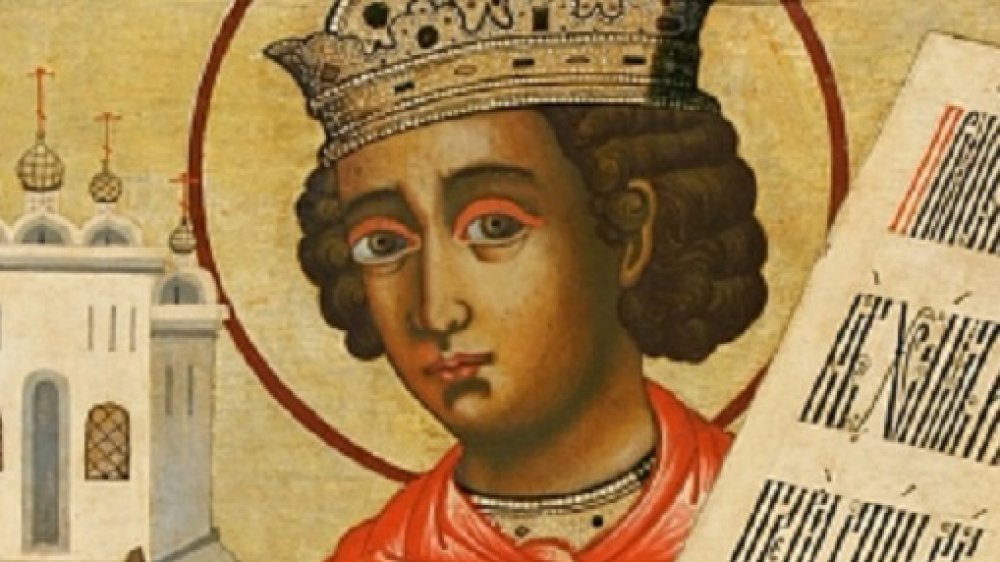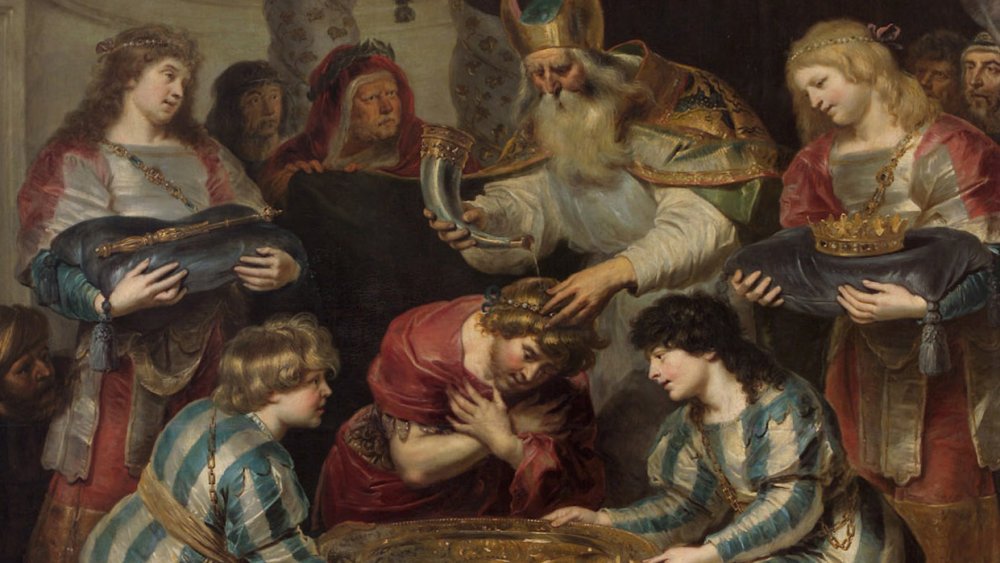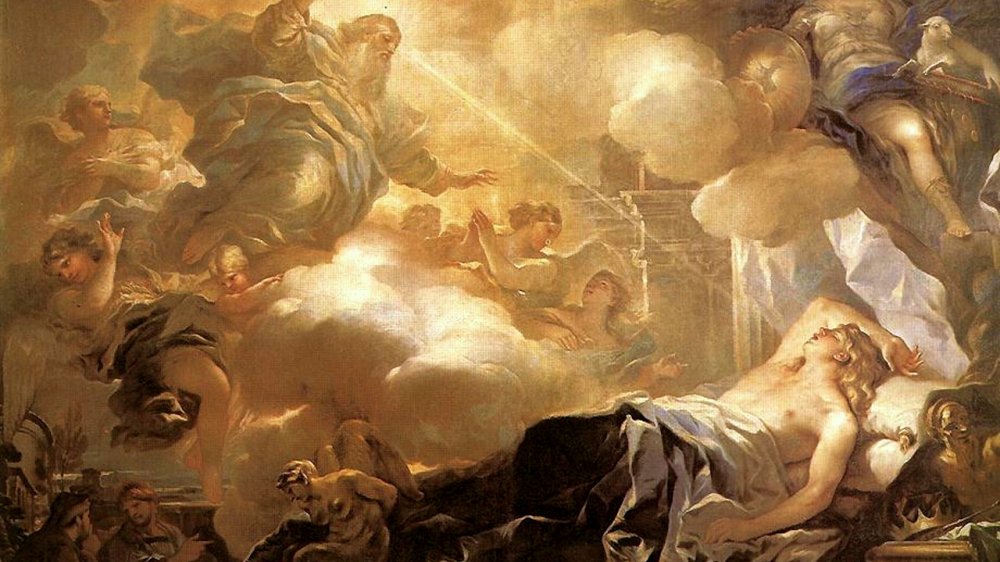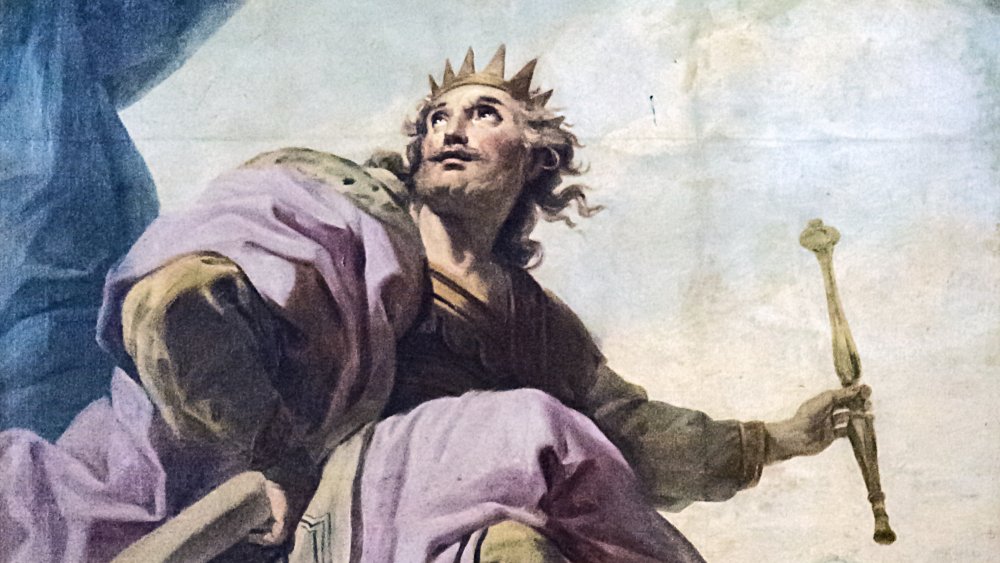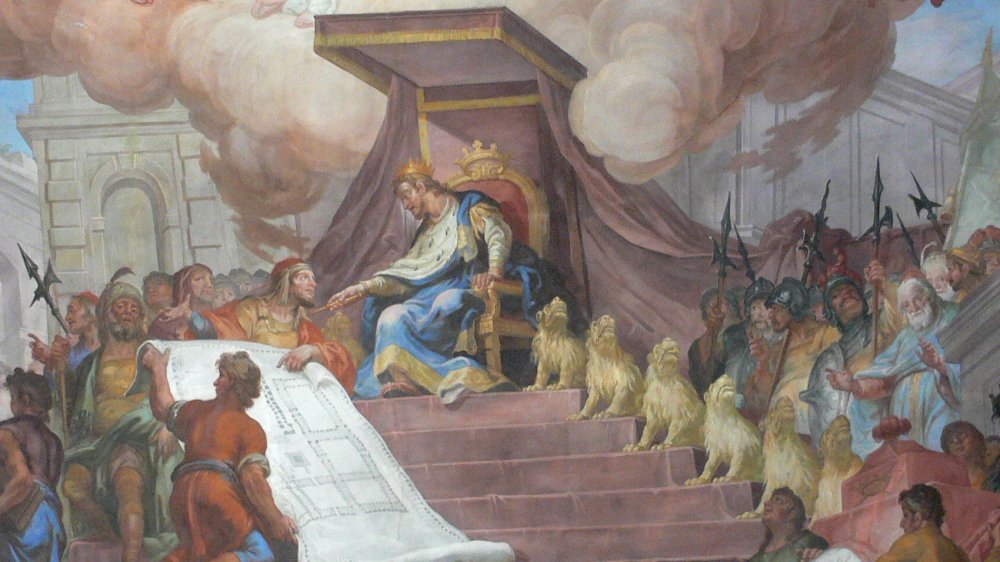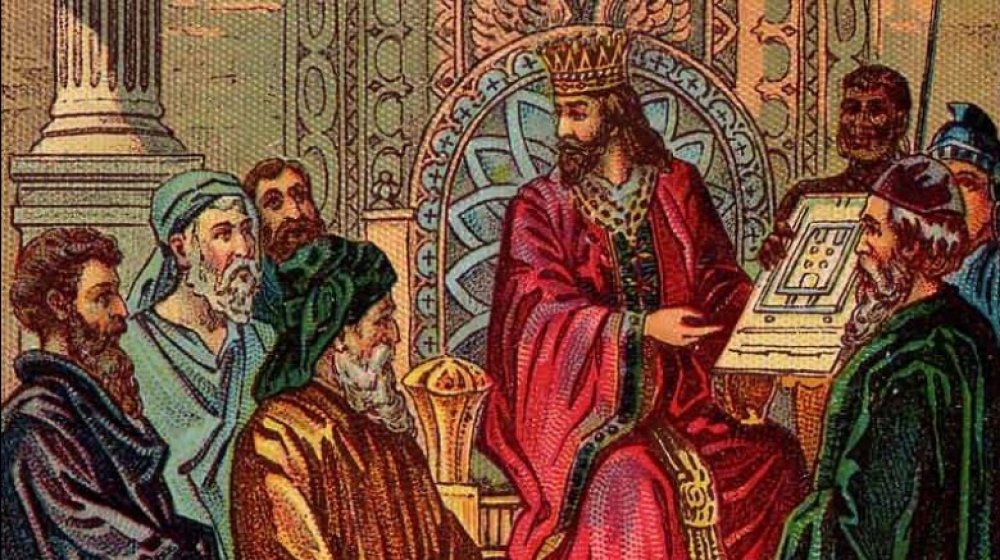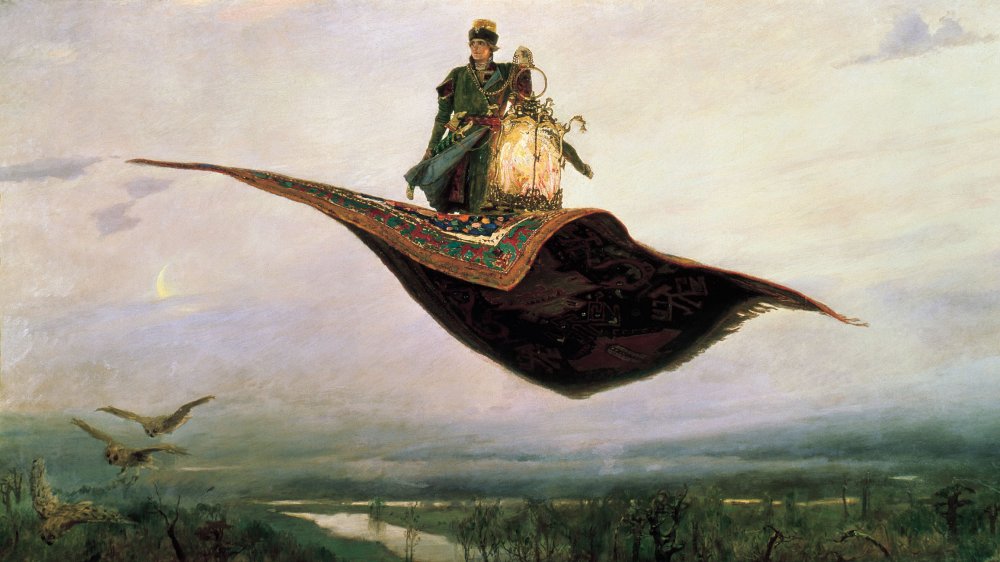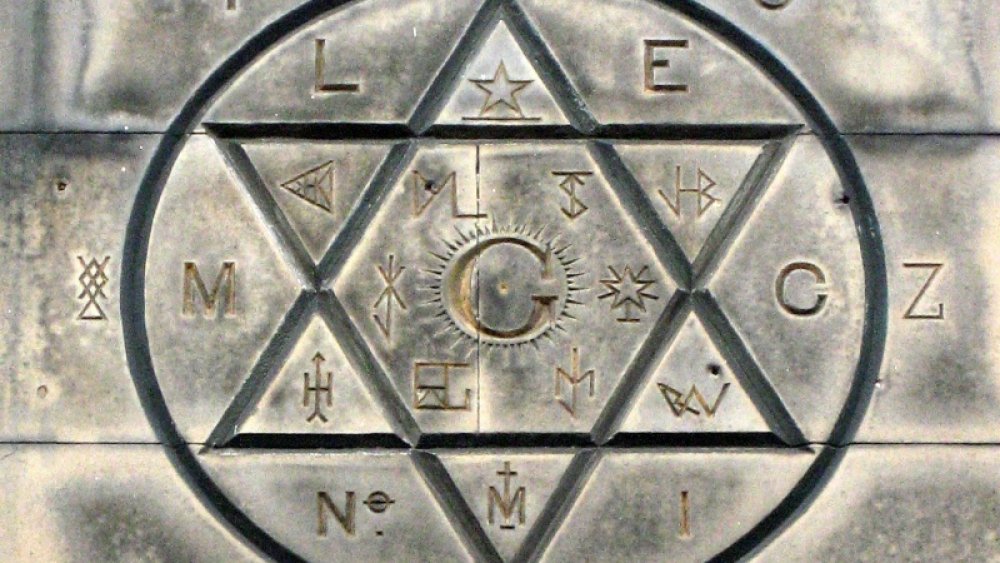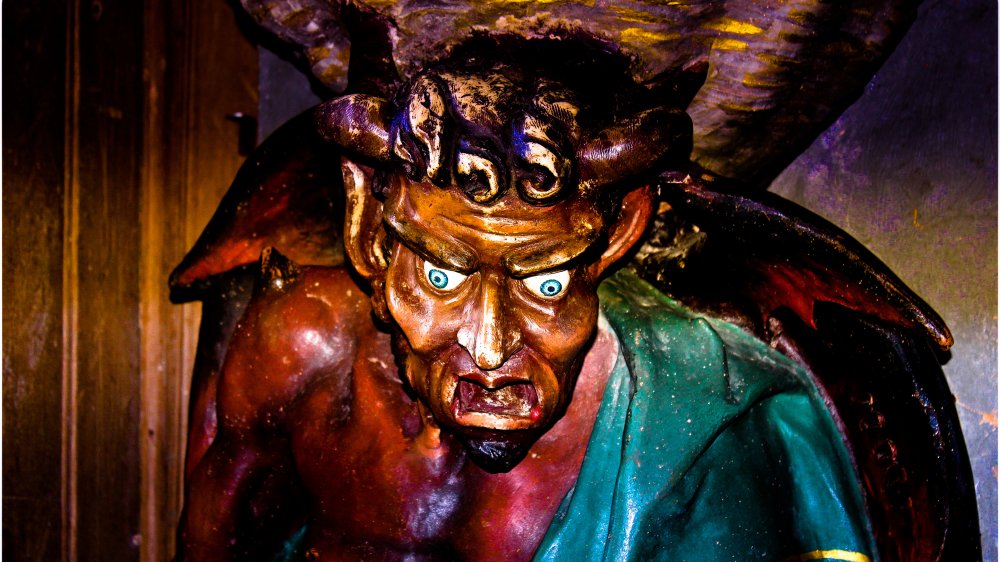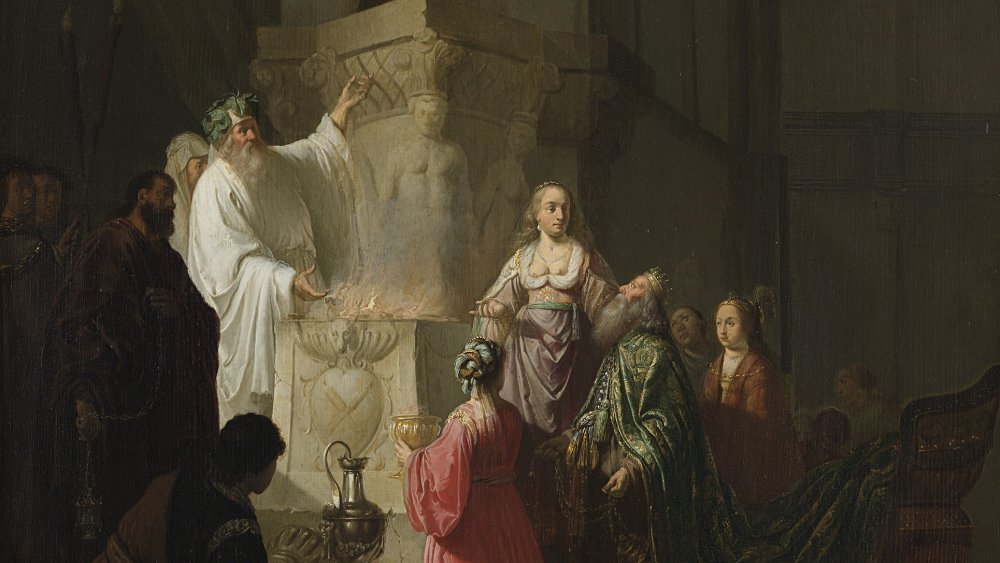The Untold Truth Of King Solomon
Solomon was a ruler of the United Kingdom of Israel who lived some time in the 10th century BCE, and in the 3,000 years since then, his name has become synonymous with wealth, power, and—above all—wisdom. The guy was so renowned for his judgment and knowledge that powerful figures like the Queen of Sheba would travel the world just to meet him. But Solomon's presence was so great not even the Bible could contain him, and legends of his great accomplishments pervaded both Jewish and Islamic folklore, telling of his dominion over demons, djinn, animals, and all the powers of the Earth.
If all you know about Solomon is he once threatened to cut a baby in half and the most uncomfortably sexy book of the Bible is named after him, you've got a lot to learn. Climb up the robot lion steps of Solomon's mechanical throne to the splendiferous wealth of the untold truth of King Solomon.
Solomon's rise to power is like something out of Game of Thrones
Solomon was the son of King David of Israel, the one who killed Goliath and played a secret chord that pleased the Lord and all that. His mother was Bathsheba, a woman David had watched taking a bath, had to have, and then murdered her husband to cover up the adultery. The first child of this union had (quite unfairly, really) died for his parent's dirty sins. Their second child was born in wedlock and so prospered as a peace offering between David and God. That's why his name—Solomon—comes from the word shalom, meaning "peace." (He was also known by the name Jedediah, "friend of God.")
Somewhat ironically, then, Solomon's accession to the throne of Israel was anything but peaceful. The First Book of Kings records David's heir apparent, Adonijah, had basically usurped the throne from his elderly father and had the support of military leaders, but not the priests and prophets. The prophet Nathan and Bathsheba conspired to get David to name Solomon his heir. Nathan, Bathsheba, and Zadok the priest then staged a coup where they installed Solomon as the new king, which the nation riotously approves of. When Adonijah's guests and counsel hear the cheers, they flee, leaving Adonijah to beg for his life on the altar. Solomon, the new teen king, allows Adonijah his life on the condition that he swears to avoid wickedness.
Where the wisdom of Solomon comes from
King Solomon is primarily known for two attributes: his great wisdom and his great wealth. But only one of those is so closely linked to him that it's one of the powers of SHAZAM! (Hint: Billy Batson doesn't get super rich when he calls down the lightning.) Other people have been rich, but only Solomon has the renown as the wisest dude who ever lived.
Solomon's wisdom wasn't fully innate, however. 1 Kings explains his legendary sagacity was a gift from God. After making a sacrifice to God, Solomon fell asleep and the Lord appeared to him in a dream, offering him anything his heart desired (presumably wishing for more wishes was off the table). Following his father's example of righteousness and faithfulness, Solomon shrewdly asked only for the wisdom to govern justly and to discern good and evil. God was pleased he hadn't asked for a long life or riches or death to his enemies, so He made Solomon as wise as possible, and rich to boot. The most famous example of Solomon's wisdom is the story about cutting the baby in half, known as the Judgment of Solomon, but his reputation extends to the books of Proverbs, Ecclesiastes, and Song of Songs, as well as apocryphal books such as Wisdom of Solomon, Odes of Solomon, and Psalms of Solomon being attributed to him.
Solomon dunks on Pharaoh
Tons of examples of Solomon's famous wisdom can be found throughout Jewish legend, just in case bisecting a baby wasn't enough evidence of great prudence. The Jewish Encyclopedia reports legend had it Solomon understood the languages of animals and birds, and he could determine a person's guilt simply by looking at them without need for a trial, which seems super suspect, but okay! He also once resolved an inheritance dispute involving a man with two heads who claimed two shares of the estate. One well-known story has him triumphing in a battle of wits against the Pharaoh of the Egyptians, a people who were themselves renowned for their wisdom and guile.
As the story goes, as Solomon was preparing to build his great temple, he sent to Pharaoh asking for him to supply him with builders and architects. Pharaoh thought to cheat Solomon by sending only men his astrologers had determined would die within a year. This didn't fool Solomon, though, whose discernment allowed him to see the men's fates just by looking at them. As such, he sent the men back to Pharaoh with coffins and burial shrouds in tow, along with a letter saying if Egypt had such a shortage of coffins and shrouds, there was no need to send all these men to get them, the Pharaoh could just ask Solomon directly.
King Solomon's elaborate robot chair
Solomon's great wisdom and great wealth were both on display in the king's wondrous throne, which according to Jewish rabbinical literature was a mechanical masterpiece, in which golden robot animals performed a wonderland of functions as Solomon ascended to his seat of power. The Jewish Encyclopedia describes it as set at the top of a series of stairs which bore dozens of golden animals, including lions, eagles, wolves, tigers, camels, and peacocks.
As Solomon reached the first step, a robot ox stretched out its leg for him to lean on, and each successive step's animals did the same. When he reached the top, robot eagles lifted him into his seat. When he sat down, another robot eagle placed the crown on his head and robot lions and eagles provided shade. A robot dove would then descend and place a Torah scroll on his lap, and Solomon would rest his feet on a footstool made of sapphires brought to him from Heaven by a demon. When people came to petition the king, all the animals would make their appropriate noises, which would scare off people who came to deliver false testimony. After Solomon's death, the throne is said to have been taken by foreign kings who looted Solomon's great treasures. However, none of them knew how to use it properly, and multiple kings and Pharaohs found themselves crippled by Solomon's robot lions.
Solomon's 1000 wives
If there's one thing Solomon is famous for having a lot of besides wisdom and wealth, it's wives. According to All the Women of the Bible, King Solomon had 300 wives and 700 concubines, which is basically a slave whose job is to do sex with you. Depending on how you look at it, in modern terms Solomon would definitely either be classified as a sex addict or a wife guy. His real problem, however, is he didn't just settle down with a nice Jewish girl like his mom presumably wanted. Instead, his wives were princesses plucked variously from the Gentile nations of the Moabites, Ammonites, Edomites, and Hittites, among others. He marries the daughter of the Egyptian Pharaoh to shore up a political alliance, but 1 Kings 11 says all the other marriages were for love. The problem with Solomon introducing all these foreign princesses into his home is they brought their foreign gods with them, which is going to cause trouble for Solomon down the line.
A peculiar thing about the Bible is you can have literally one thousand women in a room and only one of them—at best—will get a name. In the case of Solomon's wives, the only one whose name we know is Naamah the Ammonite, who is mainly notable for being the mother of Rehoboam, Solomon's son and successor as king.
Solomon the builder
Arguably, Solomon's greatest achievement as king was the completion of the First Temple in Jerusalem, which he built according to the wishes of his father, David, and God. As Ancient History Encyclopedia explains, the Bible credits Solomon with planning, funding, and executing the construction of the Temple in order to create a permanent location for the Ark of the Covenant, i.e., the literal physical presence of God. The Temple was built to mimic the shape of the Tabernacle that had been used to house the Ark while the Israelites wandered the desert, but it was twice the size, made of stone, cedar, and gold, with elaborate carvings and bronze pillars inside. The Bible records the building of this architectural marvel took seven years, at the end of which Solomon sacrificed 22,000 oxen and 120,000 sheep. Truly one heck of a barbecue.
The Temple was not Solomon's only construction project, however. Other building projects in Jerusalem included a palace complex that featured the House of the Forest of Lebanon, the Hall of Pillars, and the Hall of Justice, as well as a residence for himself and one for Pharaoh's daughter (where did the other wives live? A mystery). Further, he built outside of Jerusalem as well, including rebuilding cities such as Palmyra, and constructing harbors such as Ezion-Geber for his vast fleets.
King Solomon's giant eagle mount
Jewish legend and rabbinic literature build up the glory of Solomon's reign to truly amazing extremes. During his reign, the moon never waned and good always triumphed over evil. Until his downfall, Solomon was considered the true monarch of the whole world, including the animal kingdom and the realms of angels and demons. As such, demons would bring him jewels just because, and animals would walk willingly into his kitchens and offer to be eaten by him.
As the Jewish Encyclopedia explains, however, Solomon's most loyal animal companion was a giant eagle that would, like, do errands for him and stuff. One of these errands was seeking out a magic worm that helped Solomon build the Temple, but obviously the main thing you're going to do if you have a giant eagle and you can speak eagle language is ride around on it. Solomon had a throne of light that he would place on the eagle's back, and the eagle would fly him to the cliffs of dark mountains where God had chained up the fallen angels Uzza and Azzael. The eagle would perch on the chains, and Solomon would use his magic ring (more on that later) to compel them to reveal to him all the mysteries of the universe, thereby increasing his wisdom. Sometimes it's good to be a wizard king who is also a beastmaster.
The enormous flying carpet of King Solomon
When you're a wealthy king with dominion over all the animals and magic spirits of the world, flying around on a large bird on a chair made of light might not be cool enough for you. Fortunately, King Solomon also had an enormous flying carpet he could tool around on. This carpet features heavily in a famous Jewish legend that is also retold in the Quran, in which Solomon gets dunked on in the Valley of the Ants.
According to the Jewish Encyclopedia, the carpet was 60 miles long and 60 miles wide (a staggering 3600 square miles) and made of green silk and gold thread. Thousands of people could sit on it with him, and one day he was flying on it and boasting about how great a king he was, and the wind intentionally shook off 40,000 people to teach him some humility (rough lesson for the passengers). The carpet then flies over a valley of ants and Solomon hears the queen warning her ant subjects to hide lest the evil Solomon destroy them. Solomon asks the ant queen what she means, and she demands to be treated as an equal with him. Solomon gets mad when the ant queen says she is a greater monarch than he is, but she points out he was born of a common man, and an adulterer, no less. Shamed, Solomon flies his magic carpet back to his giant palace.
Solomon's demon-enslaving magic ring
Of all of Solomon's magic items that he used during his reign, probably the most famous is his ring that let him control demons. In many popular folktales of Solomon, this ring was known as the Seal of Solomon and featured a six-pointed Star of David on it, but in the early demonological text the Testament of Solomon, the ring is described as bearing a pentalpha, that is, a pentagram. In that text, Solomon receives the ring from the archangel Michael after he discovers a demon sucking the life energy out of a boy he favored through his thumb, as well as stealing half his food and salary for some reason.
Once Solomon realizes his new power, he summons the demons one by one, learns their powers and dominions and to which constellations they are bound, as well as which angel has power over them. Once he has gained this wisdom, Solomon puts the demons to work on building the Temple. The cornerstone of the Temple, which was thought to be too heavy to lift, is put in place by a wind demon Solomon captured in a wineskin using the power of the Seal of Solomon. Finally, he summons a demon of the Red Sea who had powered the Egyptian wizards who fought Moses and forces him to put a miraculous pillar in place.
King Solomon built the Temple with a magic worm
While Solomon is believed in popular lore to have built the Temple with the aid of angels and demons, with most of the stones floating and settling in place through magic, the heavenly host and infernal hordes were not the only supernatural aid the king employed. Solomon's Temple was thought to be one of peace (that's what his name means, remember), and so it was believed it would not have been built with saws or picks or any implements that could also have been used to shed human blood. So how do you cut stones into shape, then? Simple: with a magical worm called the shamir, who has the power to cut through stone, iron, or even diamond.
As the Jewish Encyclopedia explains, Solomon used his power over demons to ask the chief of demons where the shamir could be found. The demon told him the worm had been entrusted by the prince of the sea to a bird called "the mountain cock," who had sworn to defend it with his life. Solomon and his men searched all over for the mountain cock's nest, and when they found it, covered it with glass. When the cock returned and couldn't get through the glass, he got the shamir to cut through it. After the bird produced the worm, Solomon shouted, causing it to drop the worm, which Solomon took for his own purposes.
Solomon got yeeted by the chief of demons
Out of all the demons Solomon tangled with during his 40-year reign, the one he most butted heads with was the chief of the demons, Asmodeus. In a story from the Talmud known as "King Solomon and Ashmedai" (another version of the name Asmodeus), after Solomon captures Asmodeus so he will tell him the location of the shamir (in this version described as a magic rock rather than a worm), he puts him on house arrest and asks him a number of questions related to the demon's weird behavior. When he asks him about the nature of demons' power over humans, Asmodeus tells Solomon to give him his magic ring and he'll show him.
For some reason, Solomon agrees to this and Asmodeus swallows the ring (in some versions he throws it into the sea) and then hurls Solomon over a thousand miles away. Solomon, without his signs of office, is forced to live as a beggar while Asmodeus assumes the throne of Israel disguised as Solomon (the only sign of his true identity being his demon feet, which he kept covered at all times). The real king eventually makes his way back to Jerusalem (in some versions after finding the ring in the belly of a fish he had bought in a far distant city), and using either his ring or a chain engraved with the ineffable name of God, drove Asmodeus away and resumed the throne.
King Solomon had 999 problems, and a foreign wife was every single one of them
Solomon's great wisdom, wealth, and magical power was all contingent on his continued faithfulness to God. As soon as he abandoned that, he lost God's favor and incurred his divine wrath. According to Expositions of Holy Scripture, Solomon's trouble began because of his numerous foreign wives. He not only allowed the worship of strange gods within his household, he even began worshiping them himself, building places of worship for a god known as "the abomination of Moab" and the Ammonite god Moloch, whose traditional worship included sacrificing children. According to the Testament of Solomon, he even made sacrifices to Moloch in the form of crushing locusts in his hand in exchange for sex with the Shunammite woman (the object of desire in the incredibly lusty Song of Solomon).
However, while Solomon lost his wisdom and power, God also punished him and his line by removing most of the tribes of Israel from rule under the line of Solomon. Ten of the tribes of Israel rejected Solomon's son and heir Rehoboam, making Solomon the last king of a united Israel. Rehoboam became the king over the southern kingdom of Judah, while the northern kingdom of Israel installed the strangely similarly named Jeroboam as their new king. The United Monarchy had lasted just over 100 years, and the two kingdoms would never be united again.
